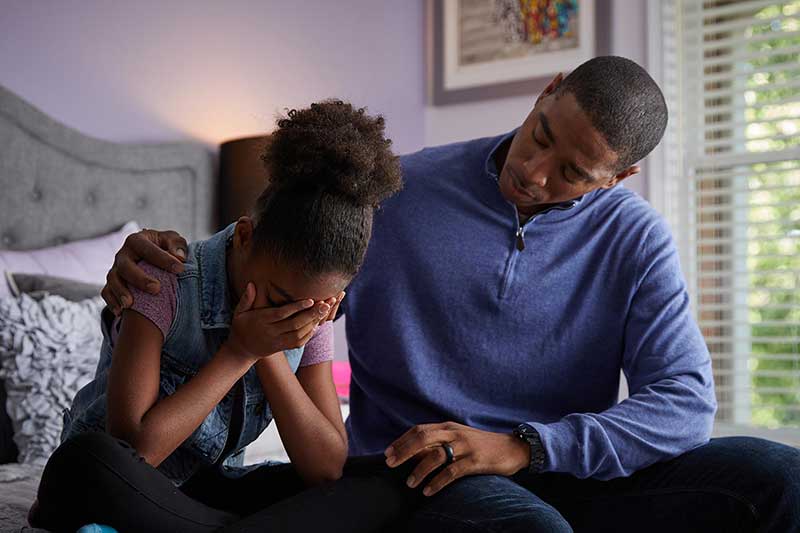Grief, Types & Stages
What are the types of grief?
Grief is a natural response to loss, and it can manifest in different ways for different people. There are several recognized types or patterns of grief, including:
- Normal or uncomplicated grief: This is the most common type of grief and is a natural response to loss. It involves a range of emotions, such as sadness, anger, guilt, and disbelief. Over time, people typically adjust to the loss and find ways to cope and move forward with their lives.
- Anticipatory grief: This type of grief occurs before a loss actually occurs, often when a loved one is terminally ill or facing a life-threatening condition. Anticipatory grief allows people to begin the grieving process before the actual loss, which can help them prepare emotionally.
- Complicated grief: Also known as prolonged grief disorder, complicated grief is a type of grief that persists for an extended period and is accompanied by intense and prolonged symptoms of grief, such as yearning, longing, or preoccupation with the deceased. It can interfere with daily functioning and may require professional intervention.
- Disenfranchised grief: This type of grief is not openly acknowledged or socially supported, often because the loss is not recognized as significant by others. Examples include the loss of a pet, a miscarriage, or the loss of a relationship that was not officially recognized (e.g., a same-sex partner).
- Collective grief: This occurs when a community or group of people experiences a loss together, such as a natural disaster, mass shooting, or other traumatic event. Collective grief can be particularly challenging as individuals navigate their own grief while also supporting others in the community.
- Ambiguous grief: Ambiguous grief occurs when there is a loss, but the circumstances surrounding the loss are unclear or the person is physically present but psychologically absent (e.g., due to dementia or severe mental illness). This type of grief can be complex and challenging to process.
- Secondary or vicarious grief: This type of grief occurs when someone experiences grief as a result of witnessing or hearing about the loss experienced by another person. This can happen, for example, in healthcare professionals who care for terminally ill patients or in family members of those who have experienced a traumatic loss.
It’s important to recognize that grief is a highly individual and personal experience, and people may experience a combination of these types of grief or may move between different types as they navigate the grieving process.
What are the stages of grief?
The stages of grief, as originally proposed by psychiatrist Elisabeth Kübler-Ross in her 1969 book “On Death and Dying,” are a framework to understand the emotional and psychological responses to loss. These stages are not necessarily linear and can vary widely among individuals. The five stages of grief are:
- Denial: The initial stage of grief is often characterized by disbelief or denial of the reality of the loss. This can serve as a protective mechanism, allowing the individual to gradually come to terms with the loss.
- Anger: As the reality of the loss sets in, feelings of anger may arise. This anger can be directed at oneself, others, or even the person who has died. It is a natural response to feelings of helplessness and can be a way to express the pain of the loss.
- Bargaining: In this stage, individuals may attempt to negotiate with a higher power or make deals in an attempt to reverse or mitigate the loss. This can involve thoughts or statements such as “If only I had done something differently, maybe this wouldn’t have happened.”
- Depression: As the full impact of the loss is realized, feelings of sadness, emptiness, and despair may set in. This stage is characterized by a deep sense of mourning and may involve withdrawal from others and a sense of hopelessness.
- Acceptance: The final stage of grief involves coming to terms with the loss and finding a way to move forward. This does not mean that the individual is “over” the loss or that they will not continue to experience sadness, but rather that they have accepted the reality of the situation and are finding ways to live with it.
It’s important to note that not everyone will experience all of these stages, and they may not occur in a specific order. Additionally, the grieving process is highly individual, and people may move through these stages at their own pace. Some individuals may also experience other emotions or stages of grief not included in this framework.
How do I best deal with grief?
Dealing with grief can be a deeply personal and challenging process, and there is no one-size-fits-all approach. However, there are some strategies that may help you cope with grief:
- Allow yourself to grieve: Give yourself permission to feel whatever emotions come up, whether it’s sadness, anger, guilt, or confusion. It’s important to acknowledge and express your feelings rather than trying to suppress them.
- Seek support: Reach out to friends, family members, or a therapist for support. Talking about your feelings with others who understand can be incredibly helpful. Support groups for people who have experienced similar losses can also be beneficial.
- Take care of yourself: Grieving can take a physical toll, so it’s important to take care of your physical health. Eat well, exercise regularly, and get plenty of rest. Avoid using substances like alcohol or drugs to cope with your feelings.
- Express your feelings creatively: Find ways to express your feelings creatively, such as through writing, art, or music. This can be a cathartic way to process your emotions.
- Allow yourself to remember: It’s natural to want to avoid reminders of the loss, but allowing yourself to remember and cherish the good times can be healing. Create a memory book or participate in activities that honor the memory of your loved one.
- Set realistic expectations: Grieving takes time, and there is no set timeline for how long it should take. Be patient with yourself and allow yourself to grieve at your own pace.
- Seek professional help if needed: If you’re struggling to cope with your grief or if it’s interfering with your ability to function, consider seeking help from a therapist or counselor who specializes in grief and loss.
Remember that everyone grieves differently, so it’s important to find what works best for you. Allow yourself to feel your emotions, seek support when you need it, and be gentle with yourself as you navigate the grieving process.




